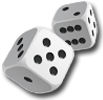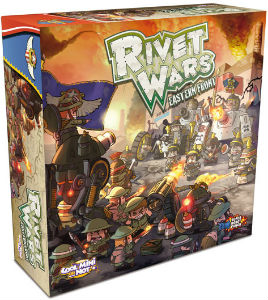



play board games
Board game reviews, strategy tips & session reports
Rivet Wars Review
 Stats:
Stats:
No. of players: 2
Amount of time to play: 30-45 min
Age requirements: 14+
Set-up time: 5 min
Rivet Wars is a miniatures skirmish game that plays quick, is easy to teach and fun. You must guide your forces to victory by holding objectives and completing secret missions.
Rivet Wars Rules Description:
Rivet Wars comes with ten scenarios. The scenario determines board set-up, resources gain each round and your winning conditions. There are two armies to choose from the Blight or Allies.
To start each turn you draw an action card and up to two secret mission cards. You may only have three action cards and two secret mission cards. Action cards give you advantages like reinforcements or extra attacks. Secret missions get you VPs for accomplishing different things on the battlefield.
Each turn you gain deployment points and rivets. You spend these on units that may be deployed to your side of the board. Most units cost one or two deployment points. The few bigger units cost two or three deployment points and also cost rivets. Any deployment points you don’t use on your turn are lost but rivets accumulate when not used.
After deploying them your units attack. You must attack units in a grid in a particular order. An attacking unit rolls a number of six-sided dice depending on the armor of their target. If any of those die roll a five or six they inflict one wound. Different units are better for attacking different armor types. If you attack units in a bunker you lose one die from your attack roll (you always roll at least one die).
After resolving combat you move your units. Objectives are also bunkers and you may only enter them with infantry units. And no unit can enter a space with an enemy unit.
To end your turn you gain VPs for holding objectives and check to see if you have met the win condition. If you have and you are the first player your opponent gets to take their turn. If you are tied at the end of their turn you keep playing. If not the player with the most VPs wins the game.
Quick Review of Rivet Wars:
Rivet Wars is a tactical miniatures game that plays fast and looks to be building to bigger and better things. The mechanics are simple enough that kids can understand them yet have enough depth for adults to enjoy the game too.
The components are fantastic. The miniatures look great and are really cute. The art is whimsical and helps convey the theme of the game. The rules are easy to follow and the initial scenarios help teach you how to play.
Rivet Wars has an interesting rock, paper, and scissors element to it. Certain unit types fight one particular type of unit better than another. But it isn’t straight up by unit type, i.e. infantry beats cavalry, which beats tanks, which beats infantry. It is more complex than that. The Allies infantry unit is great against the Blight infantry unit. Whereas the Blight infantry unit does better against the Allies support units than their infantry. This dynamic combined with the attacking order makes deployment decisions, positioning and combat interesting.
I also like the variety in the units. There are five types of units and eight different units for each army. Some units have special abilities including moving before combat, hitting all units in a grid or buffing other units. Hero units are a bit more powerful but once they are lost, may not be deployed again.
Rivet Wars seems to have a bright future. There are things in this game that point toward expansions that will only make the game better.
The game is not perfect. Though very accessible some might consider it too light. It can sometimes move too quickly. One game I played was over in four rounds and felt like it was over before we really got to deploy some of the bigger units.
Rivet Wars is a fun, quick tactical miniatures game that looks great and should only get better. If you are looking to add a game like this to your collection, pick this one up.
Score and synopsis: (Click here for an explanation of these review categories.)
Strategy 4 out of 6
Luck 5 out of 6
Player Interaction 6 out of 6
Replay Value 4 out of 6
Complexity 3 out of 6
Fun 5 out of 6
Overall 5 out of 6

Leave a Reply